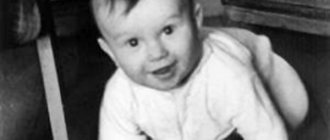Biography
Raimonds Pauls is a famous Latvian composer whose work was loved by Soviet and Russian listeners. Author of songs by pop stars - Laima Vaikule, Alla Pugacheva, Valery Leontyev and others. Organizer of the New Wave music competition, People's Artist of the USSR.
Political activity[ | ]
Deputy of the Supreme Council of the Latvian SSR (1985-1989), People's Deputy of the USSR (1989-1991). Since 1988 - Chairman of the State Committee of the Latvian SSR for Culture, from 1989 to 1991 - Minister of Culture of the Latvian SSR. From 1991 to 1993 - Minister of Culture of Latvia in the cabinet of Ivars Godmanis. From 1993 to 1998 - Advisor to the President of Latvia on culture.
In 1998, he was elected to the Seimas on the list of the New Party, and in 2002 and 2006 he was re-elected from the People's Party. In 1999 he was nominated for the post of President of Latvia, but withdrew his candidacy.
Childhood and youth
Raymond Pauls was born on January 12, 1936 in Riga. The future maestro had a unique family: father Voldemars Pauls, a Latvian by nationality, worked as a glassblower, and mother Alma-Matilda became a housewife after the birth of her son. However, her profession also turned out to be extraordinary: before starting her family life, Alma-Matilda worked for a long time as a pearl embroiderer.
Raymond Pauls in childhood
Raimond Pauls's parents were not at all devoid of musical talent: the father of the future famous composer played drums in the Mihavo orchestra, which was the result of the amateur performances of several self-taught musicians. Rumor has it that shortly after the birth of his son, Voldemar Pauls accidentally came across Arthur Kubert’s book “Paganini”. After reading it, he was so inspired by the example of the famous musician’s work that he bought his son a violin and sent him to kindergarten at the Riga Music Institute.
This happened shortly before the entry of Soviet troops. Soon Voldemar Pauls sent his family from Riga to the village, where his wife and son were safer, and professional music lessons had to be forgotten for some time. But World War II ended, the Paulses returned to Riga, and at the age of ten, Raymond entered the music school named after. E. Darzina, who worked at the Latvian State Conservatory.
Raymond Pauls in his youth
At first, ten-year-old Pauls did not do well academically. But his innate talent, Olga Borovskaya’s teaching flair, as well as the chocolates with which she generously treated gifted students quickly did their job. The future composer achieved success in playing the piano and finally fell in love with this universal musical instrument. He subsequently studied piano at the Latvian Conservatory. Jazep Vitol, and then at the same conservatory, but in the composition class.
Even in high school of music school, Raymond Pauls felt an irresistible craving for a musical direction that was far from classical - jazz. As the composer himself later admitted, he “threw headlong into jazz, like into a pool.” The young musician enjoyed playing at dance parties, improvising and playing the piano without notes. Having finally realized that music should become his profession for life, Pauls returned to the conservatory to study composition, as mentioned above.
Daughter of Raymond Pauls - Annette Pedersen
In the early 60s of the last century, the author of numerous pop compositions became the father of a charming daughter. The girl was named Annetta. During her school years, she was not loved by teachers and peers. They considered her a troublemaker, since Annette was proud of her father. This led to quarrels with classmates.
Raymond believed that his daughter should be an ordinary child. He never sought to make her a singer.
Having received the certificate, the daughter of Raymond Pauls, Annette Pedersen, goes to the capital of the Soviet Union. Here she becomes a student at Moscow GITIS, where she studies directing. The girl was noticed during her years of study, after which she was invited to one of the television channels, where she worked for many years. Annette is sociable, cheerful, she has a large number of friends who visit their friend very often.
In the early 90s of the last century, a girl met Marek Pedersen at one of the events. The young man worked for a Danish aviation company. Literally a few weeks after meeting, the lovers decided to officially register their marriage. First they went to Riga to receive the blessing of the girl’s parents. The Paulses were fascinated by their son-in-law, they gave their parental blessing.
The wedding took place in Moscow. It was attended by a large number of colleagues and friends of the newlyweds. They spent their honeymoon on the Riga seaside, and then went to Denmark for a few days, where the newly-made husband introduced his beloved to close people.
Young people began to live in the capital of the Russian Federation. They had three children, who are now adults.
Annette visits her parents quite often. She works at the Latvian consulate located in the Russian Federation.
Annette says that she is a Latvian citizen by birth, but Russia has become her Motherland. She is happy here and hopes to live for many years.
Music
In 1964, Raimonds Pauls, despite his young age for such a position, became artistic director of the Riga Variety Orchestra. His music acquired a special charm and became recognizable in professional circles. A few years later, the composer’s first original program was presented at the Concert Hall of the Latvian State Philharmonic, and tickets for it, to Raymond’s surprise, were sold out.
Raymond Pauls and Andrei Mironov
In Latvia, Pauls became famous for writing music for Alfred Kruklis's songs “Winter Evening”, “Old Birch” and “We will meet in March”. He is also known to his compatriots as an employee of the Latvian State Television and Radio, where for many years he acted as a conductor, and then as an editor of music programs. The composer was also noted for writing the musical “Sister Carrie” and a number of other works that earned awards at music festivals. The maestro’s popular musicals include the works “Sherlock Holmes”, “The Mysterious Abduction”, “Diabolism”.
In 1975, he recorded the song “Yellow leaves are circling over the city...” that is still popular to this day. The melody of this song could be heard from all radios in the Soviet Union, and it can be considered the real beginning of the all-Union popularity of Raymond Pauls, which continues to this day.
Raymond Pauls and Alla Pugacheva
The “finest hour” of the composer’s creative biography is usually called the time of his creative collaboration with Alla Pugacheva in the second half of the twentieth century, when Alla Borisovna was at the peak of her popularity. “A Million Scarlet Roses”, “Maestro”, “Without Me”, “Antique Watches” - these and other hits were warmed by people’s love and became symbols of the era in the history of the Soviet stage.
Alla Pugacheva - “A Million Scarlet Roses”
Not only Alla Pugacheva noticed the talent of the Latvian director - among his creative partners were and remain the exquisite Laima Vaikule and the temperamental Valery Leontyev. Contemporaries say that in the 1980s, Valery Leontiev was not very pleasing to the Soviet authorities, and only the fact that Raymond Pauls calmly continued to invite him to concerts helped the artist stay afloat.
The composer creates masterpieces for singers and singers, for cinematographic films, and for theatrical productions. Thus, his music can be heard in the films “How to Become a Star”, “The Devil’s Servants”, “Robin Hood’s Arrows”, “Long Road in the Dunes” and others, in theatrical productions “The Green Maiden”, “Brand”, “The Count of Monte Cristo” , "Wild Swans". It is noteworthy that each of these theatrical productions subsequently won a prize at the Yugoslav festival. The composer also appeared on camera as an actor. In 1978, Pauls played in the film “Theater”, and in 1986 in the film “How to Become a Star”, in each of which he appeared as a pianist.
Raymond Pauls. Music for the film "Long Road in the Dunes"
In 1986, Raymond Pauls took the initiative to create the International Competition “Jurmala”. The event was held for 6 years.
In 1989, Raimonds Pauls took the post of Minister of Culture of Latvia, and four years later he became the advisor to the President of the country on culture. Moreover: in 1999, the composer ran for president of his native country. But the musician soon realized that he was not ready for such responsibility. Having won in the first round and gained a majority of votes in parliament, he withdrew his candidacy.
Raymond Pauls and Diva
Pauls devotes a lot of time to public affairs. Having bought land near Riga with a former school building, the composer opened a center there for talented children. In the capital of Latvia, the musician simultaneously headed a cultural and entertainment center. The composer has several restaurants serving national cuisine.
A political career and public life did not prevent the musician from expanding his own discography. In the early 2000s, the musician delighted fans with the new musicals “The Legend of the Green Maiden” and “Ladies’ Happiness.” A decade later, the works “Leo. The Last Bohemia" and "Marlene". But the most famous was the musical play “All About Cinderella,” released in 2014. Pauls wrote the music for the production at the request of Mikhail Shvydkoy for the Russian Musical Theater.
In the new century, the songs of Raymond Pauls became decorations for the albums of famous Russian performers Valeria, Larisa Dolina, and Tatyana Bulanova.
Now Raymond spends most of his time in Latvia, maintaining contacts with pop performers, working in theaters in Riga and regularly presiding over the New Wave competition, which he himself created in collaboration with Igor Krutoy.
Raymond Pauls and Igor Krutoy
Until 2020, the music festival took place in Pauls’ homeland, and later moved to Sochi. The festival became a launching pad for many popular performers, including Sergey Lazarev, Jamala, Dima Bilan, Anastasia Stotskaya, Nyusha.
In recent years, Pauls has delved into performing activities. As a pianist, he visited most Latvian cities with recitals.
Raymond Pauls' wife - Svetlana Epifanova
In mid-1961, the popular composer met his future wife. At that time he was on tour in Odessa. From the first meeting, the young man lost his head over the young girl. After meeting, the native Odessa woman decided to become a resident of the Latvian capital.
The young lovers decided to get married secretly, since they did not have money for the celebration. To get them painted, Raymond and Svetlana invited random people as witnesses. These honored guests then became friends of the couple.
After receiving the certificate, the newlyweds went to the cinema and then bought donuts, which became the lovers’ wedding dish.
Raymond Pauls's wife, Svetlana Epifanova, was able to influence her husband. For the sake of her happiness and her daughter, our hero stopped abusing alcoholic beverages. He can only drink a little champagne at events.
The marriage of the Maestro and his wife lasts more than 50 years. The couple is still happy. They thank fate that they had the good fortune of meeting each other. The woman always goes on tour with Pauls. She helps him create works without thinking about everyday issues.
Personal life
At the end of the 1950s, Raymond Pauls went on a long tour with the Riga Pop Orchestra. One of the cities where the composer visited during his first tour in his life was Odessa. His future wife lived there: Lana (Svetlana Epifanova, that was the girl’s full name) captivated the young musician with her beauty. The girl graduated from the Faculty of Foreign Languages at the university. Philological education subsequently helped Lana adapt to Latvian society.
Wedding of Raymond Pauls and Svetlana Epifanova
Despite the average height (170 cm with a weight of 72 kg), ordinary appearance and the lack of deafening popularity that awaited Raymond only in the future, Lana reciprocated her admirer’s feelings.
The lovers got married in Pardaugava. The newlyweds did not even have witnesses; they were an employee of the registry office and a janitor. But Raymond and Lana did not pay attention to everyday difficulties. Soon their daughter Aneta was born.
Raymond Pauls with his wife and granddaughter
As Pauls himself later admitted in an interview, throughout his creative career he had problems with alcohol more than once, and it was precisely this side of life, such as family and children, that helped him quit.
Although in Soviet times the press often spread rumors about the romance of the gifted maestro and Alla Pugacheva, Raymond is still devoted to his wife. There were no shocks in the composer's personal life. This amazing marriage has already existed for more than half a century, and even in the photo from 2016 you can see with what tenderness the spouses look at each other.
Raymond Pauls
The Pauls' only daughter became a television director, married a Dane of Polish origin and gave her parents two granddaughters and one grandson. In an international family, they speak several languages: Russian, English, Latvian. So far, only granddaughter Monica, who plays the piano, has followed in her grandfather’s footsteps.
In 2012, the Pauls couple celebrated their golden wedding. The composer decided not to attach excessive solemnity to the event, but simply organized a family dinner in the Latvian style in the rural house “Lici” near Salaca. This decision was largely influenced by the health status of the author of popular songs. A year before, Raymond underwent heart surgery, due to which he was forced to cancel a number of concerts and even participation in the anniversary concert of his friend and colleague, poet Ilya Reznik.
Raymond Pauls and the children's ensemble "Cuckoo"
However, by 2020, on the date of his 80th birthday, Raymond Pauls had already become strong enough and performed an anniversary concert in Moscow. The capital of Russia always welcomes the Baltic maestro with joy, so all Russian pop stars gathered at the celebration.
Family and children of Raymond Pauls
The family and children of Raymond Pauls are a very important link in the life of the popular composer. He can do everything for the happiness of his loved ones.
Raymond's dad was a glassblower. The man was a self-taught musician. He played in his free time in one of the popular Riga bands. The father had a great influence on his son. It was thanks to this that our hero began to study music.
Mom was engaged in embroidering pictures. Her works were bought in large quantities. The fame of the woman spread throughout the Baltic states. Buyers even came from abroad.
Our hero's sister makes tapestries. She often calls her brother, wishing him long life and creative longevity.
The popular composer has only one daughter, who gave our performer three children.
The musician calls the numerous children who sang in his group “Kukushechka” his children. The composer says that he remembers all the young performers who have grown up since then. They often communicate with Raymond Pauls. On his 80th birthday, the musician received a gift from former members of the “Kukushechka” group. They recorded on disk the songs that they sang over the years under the leadership of our hero.
Raymond Voldemarovich is often involved in charitable activities. He participates in concerts to raise funds that go to help children in difficult life situations.
Discography
- 1966 - “Latvian Variety”
- 1970 - “Songs by R. Pauls to the words of A. Kruklis”
- 1971 — “Pop songs by R. Pauls based on Latvian folk texts”
- 1980 - “The melodies of the French composer F. Fourmier are played by R. Pauls”
- 1981 — Jaak Joala “Songs of R. Pauls to the words of Anatoly Kovalev”
- 1982 - “The maestro is our guest. Evening of Raymond Pauls December 29, 1981"
- 1984 - Andrei Mironov “Old Friends”
- 1984 - Valery Leontyev “Dialogue”
- 1985 - “R. Pauls. Choir named after T. Kalnina sings songs to the words of J. Peters"
- 1986 - Aya Kukule “Songs of Raymond Pauls”
- 1987 - Valery Leontyev “Velvet Season”
- 1987 - Group CREDO “Scream”
- 1987 - Rodrigo Fomin “Path to the Light”
- 1988 - Laima Vaikule “Songs of R. Pauls to the verses of Ilya Reznik”











